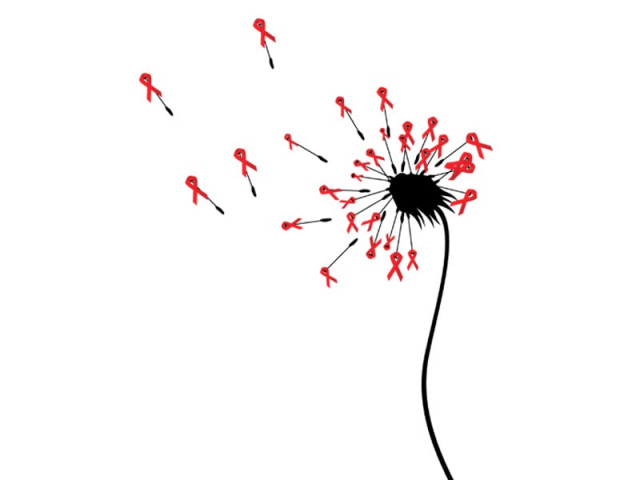AIDS: Women pay price for husbands’ indiscretions
There is a power imbalance between men and women when it comes to catching HIV without choice.

That December morning in 2009, Sabina (surname withheld on request) was happy. Her husband was moving back home permanently after having lived and worked in England for 17 years as a labourer. The house had been cleaned. His favourite food had been cooked. Sabina was expecting a child and things were looking up. But when her husband arrived, she knew at a glance something was not right.
“He looked worn-out, exhausted and unwell,” said Sabina, 43, sharing her story with The Express Tribune.
“I thought he was just tired having spent a long period away from home, earning for the studies of his two brothers, for the marriage of three sisters, to build a house for the family and looking after his wife and two school-going children. But when he revealed that he is suffering from Aids, I suddenly felt my body was torn into countless pieces,” Sabina recalled, the memory of her pain still bringing tears to her eyes.
Sabina’s plight kept getting worse, her story murkier. “I was shocked when my husband without any embarrassment admitted having relationships with other men and prostitutes without taking any protection.” Her husband contracted Aids 29 months before his return and had been under treatment since. Sabina sat in disbelief, realising that she must have contracted the virus from her husband, and it would most probably be passed on to their still to-be-born child as well.
Sabina’s story is not an unusual one. The number of women who contract infections from their husbands is reportedly very high in developing South Asian countries, including Pakistan.
Irfan Ahmad, president of Human Shield Trust who conducted a thorough study on this particular way of contracting Aids said, “In Pakistan, the number of HIV positive people is increasing day by day. Most women are infected by their own husbands, who catch the virus through illicit sexual relationships with sex workers. The health and social life of such women are badly affected.”
There is a power imbalance between men and women when it comes to catching HIV without choice. Women are particularly vulnerable to contracting HIV from the men in their life who indulge in unsafe practices.
Research shows that women are at greater risk than men of contracting HIV from sexual partnerships. This “biological sexism” applies to most sexually transmitted diseases (STDs). This is because vaginal tissue absorbs fluids more easily; the vaginal membrane is thinner than penile tissue. Also, semen has a higher concentration of viruses, including HIV, compared to vaginal secretions and may remain in the vagina for hours following intercourse, increasing a woman’s vulnerability to infection.
In Pakistan, women are at further disadvantage with respect to their fundamental human right to control their own sexuality, and to access prevention, care, treatment, support services and information. Traditional practices and patriarchal social structures play a part in the vulnerability of women to HIV infection. The insistence on bride wealth as the basis of validating a marriage makes female sexuality a commodity and reduces women to sexual objects, with limited rights and privileges compared to their husbands, who pay in order to marry them, thus leaving them without a say in their relationship.
These social implications complicate the crisis further. While families accept male members who are the actual source of introducing the virus to the family, mentalities are enclosed when it comes to women suffering from the same disease.
This happened to Sabina, who was shunned by her in-laws when they found out that she contracted the disease from her husband. “When he told his parents, my mother-in-law ordered me to leave the house immediately. Her reason was that as kitchen work was my responsibility, I was a threat for them as I may pass on the virus while handling food products.” Sabina was left shocked and abandoned. Her husband, and father of her three children, did not resist the decision of his parents. “I left the house without asking them a single question. It would have been useless when my husband did not defend me and his children,” said Sabina. As a result of isolation and severe depression, she tried to commit suicide along with her children but her parents intervened. Efforts to contact her in-laws were all in vain with no response from the other side.
One of Sabina’s friends referred her to the National Institute of Health (NIH), Islamabad, where she was tested and declared HIV positive. After numerous counseling sessions and timely medical intervention at NIH, she is now well enough to be able to earn for her children through stitching clothes. Sabina is a graduate but the HIV stigma makes it tough for her to get a proper job. She is currently living in a lower middle class locality in Rawalpindi with her children, the youngest of which is HIV positive.
Published in The Express Tribune, December 1st, 2012.



















COMMENTS
Comments are moderated and generally will be posted if they are on-topic and not abusive.
For more information, please see our Comments FAQ